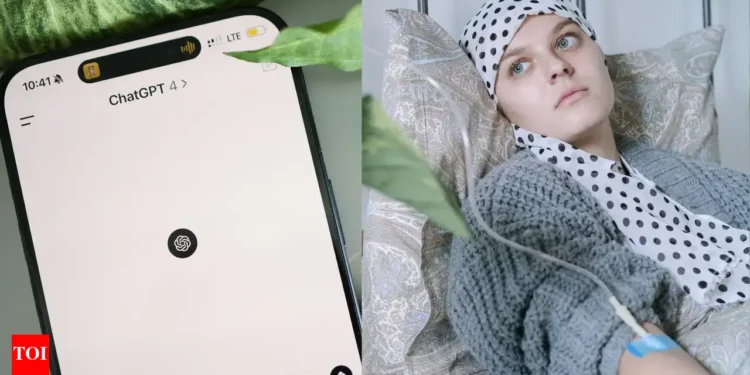Lauren Bannon decided to seek answers elsewhere — turning to artificial intelligence. Using ChatGPT, she described her persistent symptoms, and the AI tool suggested the possibility of Hashimoto’s disease, a thyroid-related condition. Prompted by this advice, Lauren requested specific thyroid tests from her doctors.
A 40-year-old woman who divides her time between North Carolina and the U.S. Virgin Islands says ChatGPT played a crucial role in uncovering her hidden cancer after doctors initially misdiagnosed her condition.
Lauren Bannon had been experiencing severe stomach pains and rapid, unexplained weight loss. However, doctors initially attributed her symptoms to rheumatoid arthritis and acid reflux. Feeling dismissed and desperate for answers, Bannon decided to turn to the AI chatbot ChatGPT for help.Thanks to the early detection, she was able to receive timely treatment, potentially saving her life by preventing the cancer from spreading.
By inputting her symptoms and asking for possible diagnoses, she received suggestions that pointed toward thyroid cancer — a condition that was later confirmed through further medical testing.
Bannon now credits ChatGPT with encouraging her to seek additional medical opinions, ultimately leading to an accurate diagnosis and timely treatment.
Her story highlights a growing conversation about the potential role of AI tools in supporting healthcare decisions, especially when patients feel their concerns are not being fully addressed.
Bannon, the owner of a marketing company, turned to ChatGPT after facing ongoing frustration with her medical care. Seeking clarity, she consulted the AI platform, which suggested that she might be suffering from Hashimoto’s disease. ChatGPT also recommended that she undergo specific thyroid tests to further investigate her symptoms.
Despite her doctor’s initial doubts about the likelihood of Hashimoto’s disease, citing the absence of any family history, Bannon persisted in requesting further testing. Her insistence paid off when thyroid scans uncovered two small cancerous lumps in her neck, leading to an early diagnosis and timely medical intervention.
Feeling abandoned by the healthcare system, Bannon shared with The Mirror how she struggled to get the help she needed.
“I felt let down by doctors,” she said. “It was almost like they were just handing out medication to get you in and out the door. I needed to find out what was happening to me — I just felt so desperate. I wasn’t getting the answers I needed.”
Frustrated and determined, Bannon turned to a tool she was already familiar with — ChatGPT.
“I had used it for work before,” she explained. “So I started typing in symptoms and asking what conditions mimic rheumatoid arthritis. It suggested I might have Hashimoto’s disease and advised me to ask my doctor to check my thyroid peroxidase antibody (TPO) levels.”
When Bannon approached her doctor with the suggestion, she faced skepticism.
“The doctor told me it was unlikely because there was no family history,” Bannon recalled. “But I insisted and said, ‘Just amuse me.'”
Woman Credits ChatGPT for Early Detection of Cancer: “It Saved My Life“
In a remarkable story highlighting the potential of AI in healthcare, a woman has shared how ChatGPT played a crucial role in detecting her cancer early — before it could spread throughout her body.
“I didn’t have the typical symptoms of Hashimoto’s disease. I wasn’t tired or feeling exhausted,” she explained. “If I hadn’t looked on ChatGPT, I would have simply taken the prescribed rheumatoid arthritis medication, and the cancer would have spread from my neck to the rest of my body.”
Thanks to her instincts and the information she gathered through ChatGPT, she pushed for further medical evaluation despite all her tests appearing normal. Doctors later confirmed that she had caught the cancer at a very early stage.
“The doctor told me I was extremely lucky. I know for certain that without ChatGPT, the cancer would have gone undetected and spread. It truly saved my life,” she said. “Even though my test results were perfect, I just knew something wasn’t right. I would have never discovered this without ChatGPT.”
Her story serves as a powerful example of how technology can complement medical care and empower individuals to advocate for their own health.
Bannon Urges Cautious Use of AI for Health Concerns After Early Cancer Detection
In a powerful testimony to the potential of AI in healthcare, Bannon is now encouraging others to consider using platforms like ChatGPT when facing health concerns — but with caution. “I would encourage others to use ChatGPT with their health concerns, act with caution, but if it gives you something to look into, ask your doctors to test you. It can’t do any harm. I feel lucky to be alive,” she shared.
Bannon’s cancer was detected early after ChatGPT flagged symptoms that led her to seek medical advice. Thanks to the timely diagnosis, doctors were able to intervene before the disease could spread to other parts of her body, greatly improving her chances of recovery. Her experience highlights how AI tools, when used responsibly, can complement traditional healthcare by prompting earlier medical evaluations.
Read Also
Pakistan Ready for ‘Neutral Investigation’ into Pahalgam Attack, Says PM Shehbaz Sharif 2025















 Categories
Categories










